【BBC六分钟英语】你知道什么是水葬么?
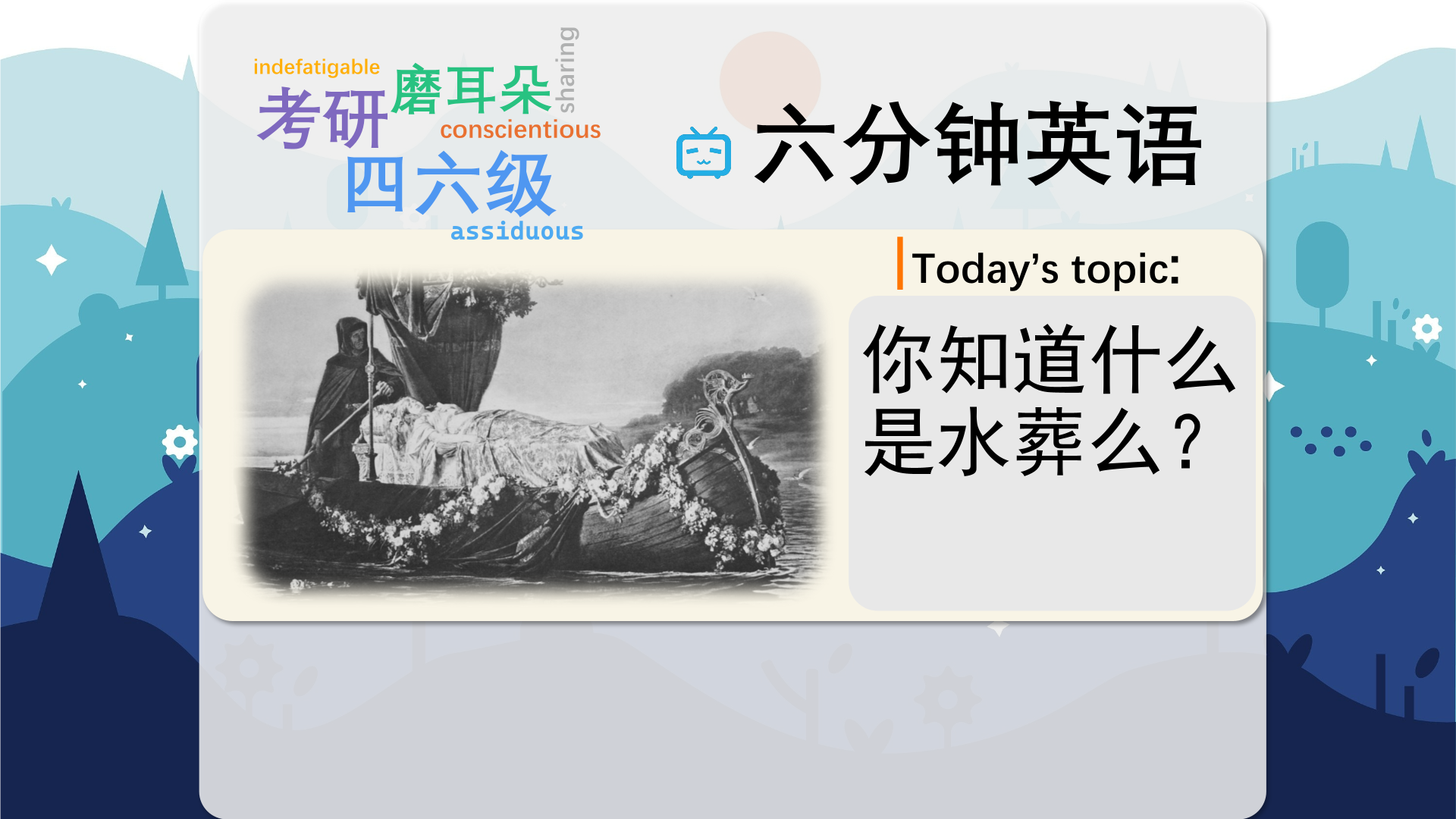
【英文脚本】
BBC LEARNING ENGLISH
6 Minute English Water burial
Transcript
Note: This is not a word for word transcript
Dan
Hello and welcome to 6 Minute English – the show that brings you an interesting topic, authentic listening practice and six new items of vocabulary. I’m Dan…
Neil
And I’m Neil. In this episode we’ll be discussing water burial.
Dan
Yes. It’s a bit of a bleak subject, I’m afraid.
Neil
Something which is bleak is unpleasant or without hope.
Dan
And, do you know what’s really bleak? It’s this week’s question. On average, how many people die each hour? a) six thousand b) sixty thousand c) six hundred thousand
Neil
I am going to guess b) sixty thousand
Dan
And we’ll find out if you’re right or not at the end of this show. So, the actual figure is 55m people each year. Now, religious or not, there is a practical issue to be dealt with, which is, Neil?
Neil
What to do with the body?
Dan
Exactly! So what are the options for the average person?
Neil
Well, there’s burial, or there’s cremation.
Dan
Burial is when a body is put into the earth and cremation is when a body is burnt. But there are big problems with both. For example, what two things do most people need in order to be buried?
Neil
Well, a coffin – or a box to put the body in and a grave. That’s the place the coffin and body go into.
Dan
Exactly, but coffins are most often made of wood. In the US they use four million acres of forest every year just to make coffins. And as for graves, cemeteries are beginning to get overcrowded – there’s no space left! After all, dying is not exactly a new thing! It’s been happening for years.
Neil
Aha, but with cremation, there’s no space needed. And they burn gas to dispose of the body. That’s got to be better.
Dan
You’d think so, but no. I’ll let Sahar Zand, reporter for the BBC, explain why.
Sahar Zand, BBC reporter
During the process, a number of toxins can be emitted into our environment, including mercury from dental fillings. Cremation also has a carbon cost. With the energy used to process one body, you could actually heat a home for the best part of a week in winter
Neil
So cremation can release toxins, or poisons, into the environment and it comes with a very high energy cost – enough to heat a home for almost a week! OK. I can see a smug look in your eye, Dan. What do you have up your sleeve?
Dan
It’s the latest thing. Water burial.
Neil
Water burial?
Dan
This is where the body is put into an alkali solution and heated to 150 degrees centigrade. This breaks down the tissue and leaves only the skeleton.
Neil
Interesting.
Dan
Yes! It has huge advantages over cremation
Neil
Such as?
Dan
Well for one thing, it takes only 4 hours to finish. It follows the same process as when a body decomposes, but quicker.
Neil
When something decomposes it breaks down and decays. Ok, anything else?
Dan
It uses much less energy. Each body is weighed and then the computer calculates exactly how much of everything is needed.
Neil
Ok, it’s more efficient too. Why are you smiling?
Dan
This is the best part! Listen to Sahar again.
Sahar Zand, BBC reporter
All that’s left at this point is a brittle skeleton and any artificial implants that they may have had in their body – and they come out almost as good as new. There’s even talk of sending the implants to the developing world, where they can benefit populations that don’t have access to them, because they’re very expensive.
Neil
So after the process you have a brittle, or easy to break, skeleton and any implants that they had inside them.
Dan
Implants are artificial additions to the body, such as plastic hips or an artificial heart. And they’re clean! They can be recycled and given to someone who needs them! Isn’t that cool?
Neil
So, what happens to the skeleton?
Dan
It gets ground up into dust and put in a jar to give to the family – exactly the same as a traditional cremation. I love it! Sign me up! Would you like to give it a shot?
Neil
Well, I can’t answer that question. But can I have the answer to our quiz question?
Dan
Of course. I asked: On average, how many people die each hour? a) six thousand b) sixty thousand c) six hundred thousand
Neil
I said b) sixty thousand
Dan
And you, my friend, are dead in the water. Unfortunately, it’s a) six thousand
Neil
Ok. Well that’s probably better, isn’t it?
Dan
Yes.
Neil
Shall we have a look at the vocabulary then?
Dan
Certainly. Our first word was bleak meaning something unhappy, unpleasant or without hope. What types of things do we typically describe as bleak, Neil?
Neil
Oh, the weather in the UK can be bleak. It’s very, very dark in the winter. Next we had grave. A grave is a hole in the earth where a body is placed. However, there is another use.
Dan
Yes. We can talk about a situation being grave. The outbreak of war is a very grave situation for many people. Then we had toxin. A toxin is a substance which is poisonous. Have you ever been poisoned by a toxin, Neil?
Neil
Well, I suppose so, yes. I’ve had food poisoning and that’s caused by toxins. After that was decompose. When something decomposes, it breaks down and decays. Much like when fruit goes bad and turns black and then becomes liquid.
Dan
Then we had brittle. Something which is brittle is easily broken. For example, Neil?
Neil
Glass, crockery, tiles and some plastic. Crisps! And finally we had implant. An implant is something artificial which has been put into the body – such as an artificial heart or a replacement hip. Would you like to have any implants, Dan?
Dan
I’d quite like robotic legs. Then I could run faster than anyone!
Neil
Well, we’ve run out of time, so that’s the end of today’s 6 Minute English. Please join us again soon!
Dan
And we are on social media too - Facebook, Twitter, Instagram and YouTube. See you there.
Both
Bye!
【中英文双语脚本】
BBC LEARNING ENGLISH(BBC学习英语)
6 Minute English Water burial
6 分钟英式水葬
Transcript(抄本)
Note: This is not a word for word transcript
注意:这不是逐字记录
Dan(担)
Hello and welcome to 6 Minute English – the show that brings you an interesting topic, authentic listening practice and six new items of vocabulary. I’m Dan…
您好,欢迎来到六分钟英语 – 该节目为您带来一个有趣的话题、真实的听力练习和六个新词汇。我是 Dan…
Neil(尼尔)
And I’m Neil. In this episode we’ll be discussing water burial.
我是 Neil。在这一集中,我们将讨论水葬。
Dan(担)
Yes. It’s a bit of a bleak subject, I’m afraid.
是的。恐怕这是一个有点凄凉的话题。
Neil(尼尔)
Something which is bleak is unpleasant or without hope.
黯淡的事物令人不快或没有希望。
Dan(担)
And, do you know what’s really bleak? It’s this week’s question. On average, how many people die each hour? a) six thousand b) sixty thousand c) six hundred thousand
而且,你知道什么是真正的黯淡吗?这是本周的问题。平均每小时有多少人死亡?a) 六千 b) 六万 c) 六十万
Neil(尼尔)
I am going to guess b) sixty thousand
我猜 b) 六万
Dan(担)
And we’ll find out if you’re right or not at the end of this show. So, the actual figure is 55m people each year. Now, religious or not, there is a practical issue to be dealt with, which is, Neil?
我们将在本次节目结束时发现你是对还是错。所以,实际数字是每年 55m 人。现在,无论是否信教,都有一个实际问题需要处理,那就是,尼尔?
Neil(尼尔)
What to do with the body?
如何处理身体?
Dan(担)
Exactly! So what are the options for the average person?
完全!那么普通人有哪些选择呢?
Neil(尼尔)
Well, there’s burial, or there’s cremation.
嗯,有土葬,或者有火葬。
Dan(担)
Burial is when a body is put into the earth and cremation is when a body is burnt. But there are big problems with both. For example, what two things do most people need in order to be buried?
土葬是指将尸体放入地下,火化是指尸体被焚烧。但两者都存在很大的问题。例如,大多数人需要哪两样东西才能被埋葬?
Neil(尼尔)
Well, a coffin – or a box to put the body in and a grave. That’s the place the coffin and body go into.
嗯,一口棺材 —— 或者一个装尸体的盒子和一个坟墓。那是棺材和尸体进入的地方。
Dan(担)
Exactly, but coffins are most often made of wood. In the US they use four million acres of forest every year just to make coffins. And as for graves, cemeteries are beginning to get overcrowded – there’s no space left! After all, dying is not exactly a new thing! It’s been happening for years.
没错,但棺材通常是用木头制成的。在美国,他们每年使用 400 万英亩的森林来制作棺材。至于坟墓,墓地开始变得人满为患 —— 已经没有空间了!毕竟,死亡并不完全是一件新鲜事!这种情况已经发生了很多年。
Neil(尼尔)
Aha, but with cremation, there’s no space needed. And they burn gas to dispose of the body. That’s got to be better.
啊哈,但是火化不需要空间。他们燃烧煤气来处理尸体。那必须变得更好。
Dan(担)
You’d think so, but no. I’ll let Sahar Zand, reporter for the BBC, explain why.
你可能会这么认为,但不是。我让 BBC 的记者 Sahar Zand 解释一下原因。
Sahar Zand, BBC reporter(SaharZand,BBC记者)
During the process, a number of toxins can be emitted into our environment, including mercury from dental fillings. Cremation also has a carbon cost. With the energy used to process one body, you could actually heat a home for the best part of a week in winter
在此过程中,许多毒素可能会排放到我们的环境中,包括牙齿填充物中的汞。火葬也有碳成本。凭借用于处理一个身体的能源,您实际上可以在冬天一周的大部分时间里为房屋供暖
Neil(尼尔)
So cremation can release toxins, or poisons, into the environment and it comes with a very high energy cost – enough to heat a home for almost a week! OK. I can see a smug look in your eye, Dan. What do you have up your sleeve?
因此,火葬会将毒素或毒物释放到环境中,并且具有非常高的能源成本 —— 足以为房屋供暖近一周!还行。我能从你的眼睛里看到一种得意的神情,丹。你有什么准备的?
Dan(担)
It’s the latest thing. Water burial.
这是最新的事情。水葬。
Neil(尼尔)
Water burial?
水葬?
Dan(担)
This is where the body is put into an alkali solution and heated to 150 degrees centigrade. This breaks down the tissue and leaves only the skeleton.
这是将身体放入碱溶液中并加热到 150 摄氏度的地方。这会分解组织,只留下骨骼。
Neil(尼尔)
Interesting.
有趣。
Dan(担)
Yes! It has huge advantages over cremation
是的!与火葬相比,它具有巨大的优势
Neil(尼尔)
Such as?
如?
Dan(担)
Well for one thing, it takes only 4 hours to finish. It follows the same process as when a body decomposes, but quicker.
首先,只需 4 小时即可完成。它遵循与身体分解时相同的过程,但速度更快。
Neil(尼尔)
When something decomposes it breaks down and decays. Ok, anything else?
当某物分解时,它会分解和腐烂。好的,还有什么吗?
Dan(担)
It uses much less energy. Each body is weighed and then the computer calculates exactly how much of everything is needed.
它使用的能源要少得多。每具尸体都经过称重,然后计算机会准确计算出需要多少东西。
Neil(尼尔)
Ok, it’s more efficient too. Why are you smiling?
好吧,它也更有效。你为什么微笑?
Dan(担)
This is the best part! Listen to Sahar again.
这是最好的部分!再听一遍 Sahar。
Sahar Zand, BBC reporter(SaharZand,BBC记者)
All that’s left at this point is a brittle skeleton and any artificial implants that they may have had in their body – and they come out almost as good as new. There’s even talk of sending the implants to the developing world, where they can benefit populations that don’t have access to them, because they’re very expensive.
此时剩下的只是一具脆弱的骨架和他们体内可能植入的任何人工植入物 —— 它们出来时几乎和新的一样好。甚至有传言说将植入物送到发展中国家,在那里它们可以使无法获得植入物的人群受益,因为它们非常昂贵。
Neil(尼尔)
So after the process you have a brittle, or easy to break, skeleton and any implants that they had inside them.
因此,在该过程之后,您会得到一个脆性或容易断裂的骨骼及其内部的任何植入物。
Dan(担)
Implants are artificial additions to the body, such as plastic hips or an artificial heart. And they’re clean! They can be recycled and given to someone who needs them! Isn’t that cool?
植入物是人工添加到体内的部件,例如塑料髋关节或人工心脏。而且他们很干净!它们可以回收并送给需要它们的人!那不是很酷吗?
Neil(尼尔)
So, what happens to the skeleton?
那么,骨骼会发生什么变化呢?
Dan(担)
It gets ground up into dust and put in a jar to give to the family – exactly the same as a traditional cremation. I love it! Sign me up! Would you like to give it a shot?
它被磨成粉末,放入罐子里送给家人 —— 与传统火葬完全一样。我喜欢!注册我!您想试一试吗?
Neil(尼尔)
Well, I can’t answer that question. But can I have the answer to our quiz question?
好吧,我无法回答这个问题。但是我能得到我们的测验问题的答案吗?
Dan(担)
Of course. I asked: On average, how many people die each hour? a) six thousand b) sixty thousand c) six hundred thousand
答案是肯定的。我问道:平均每小时有多少人死亡?a) 六千 b) 六万 c) 六十万
Neil(尼尔)
I said b) sixty thousand
我说 b) 六万
Dan(担)
And you, my friend, are dead in the water. Unfortunately, it’s a) six thousand
而你,我的朋友,已经死在水里了。不幸的是,这是 a) 六千
Neil(尼尔)
Ok. Well that’s probably better, isn’t it?
还行。嗯,这可能更好,不是吗?
Dan(担)
Yes.
是的。
Neil(尼尔)
Shall we have a look at the vocabulary then?
那我们来看看这些词汇吗?
Dan(担)
Certainly. Our first word was bleak meaning something unhappy, unpleasant or without hope. What types of things do we typically describe as bleak, Neil?
当然。我们的第一个词是 bleak,意思是不快乐、不愉快或没有希望的事情。尼尔,我们通常将哪些类型的事情描述为凄凉?
Neil(尼尔)
Oh, the weather in the UK can be bleak. It’s very, very dark in the winter. Next we had grave. A grave is a hole in the earth where a body is placed. However, there is another use.
哦,英国的天气可能很凄凉。冬天非常非常黑暗。接下来,我们遇到了坟墓。坟墓是地上放置尸体的洞。但是,还有另一个用途。
Dan(担)
Yes. We can talk about a situation being grave. The outbreak of war is a very grave situation for many people. Then we had toxin. A toxin is a substance which is poisonous. Have you ever been poisoned by a toxin, Neil?
是的。我们可以谈论情况很严重。战争的爆发对许多人来说是一个非常严峻的局面。然后我们有了毒素。毒素是一种有毒的物质。你有没有被毒素毒死过,尼尔?
Neil(尼尔)
Well, I suppose so, yes. I’ve had food poisoning and that’s caused by toxins. After that was decompose. When something decomposes, it breaks down and decays. Much like when fruit goes bad and turns black and then becomes liquid.
嗯,我想是的,是的。我有食物中毒,这是由毒素引起的。 之后是分解。当某物分解时,它会分解和腐烂。就像水果变质、变黑然后变成液体一样。
Dan(担)
Then we had brittle. Something which is brittle is easily broken. For example, Neil?
然后我们就有了脆性。易碎的东西很容易折断。例如,Neil?
Neil(尼尔)
Glass, crockery, tiles and some plastic. Crisps! And finally we had implant. An implant is something artificial which has been put into the body – such as an artificial heart or a replacement hip. Would you like to have any implants, Dan?
玻璃、陶器、瓷砖和一些塑料。薯 片!最后我们有了植入物。植入物是已放入体内的人工物品,例如人工心脏或替代髋关节。Dan,你想要任何植入物吗?
Dan(担)
I’d quite like robotic legs. Then I could run faster than anyone!
我很喜欢机器人腿。这样我就能跑得比任何人都快了!
Neil(尼尔)
Well, we’ve run out of time, so that’s the end of today’s 6 Minute English. Please join us again soon!
好了,我们的时间已经用完了,所以今天的六分钟英语到此结束。请尽快再次加入我们!
Dan(担)
And we are on social media too - Facebook, Twitter, Instagram and YouTube. See you there.
我们也在社交媒体上 - Facebook、Twitter、Instagram 和 YouTube。到时见。
Both(双)
Bye!
再见!

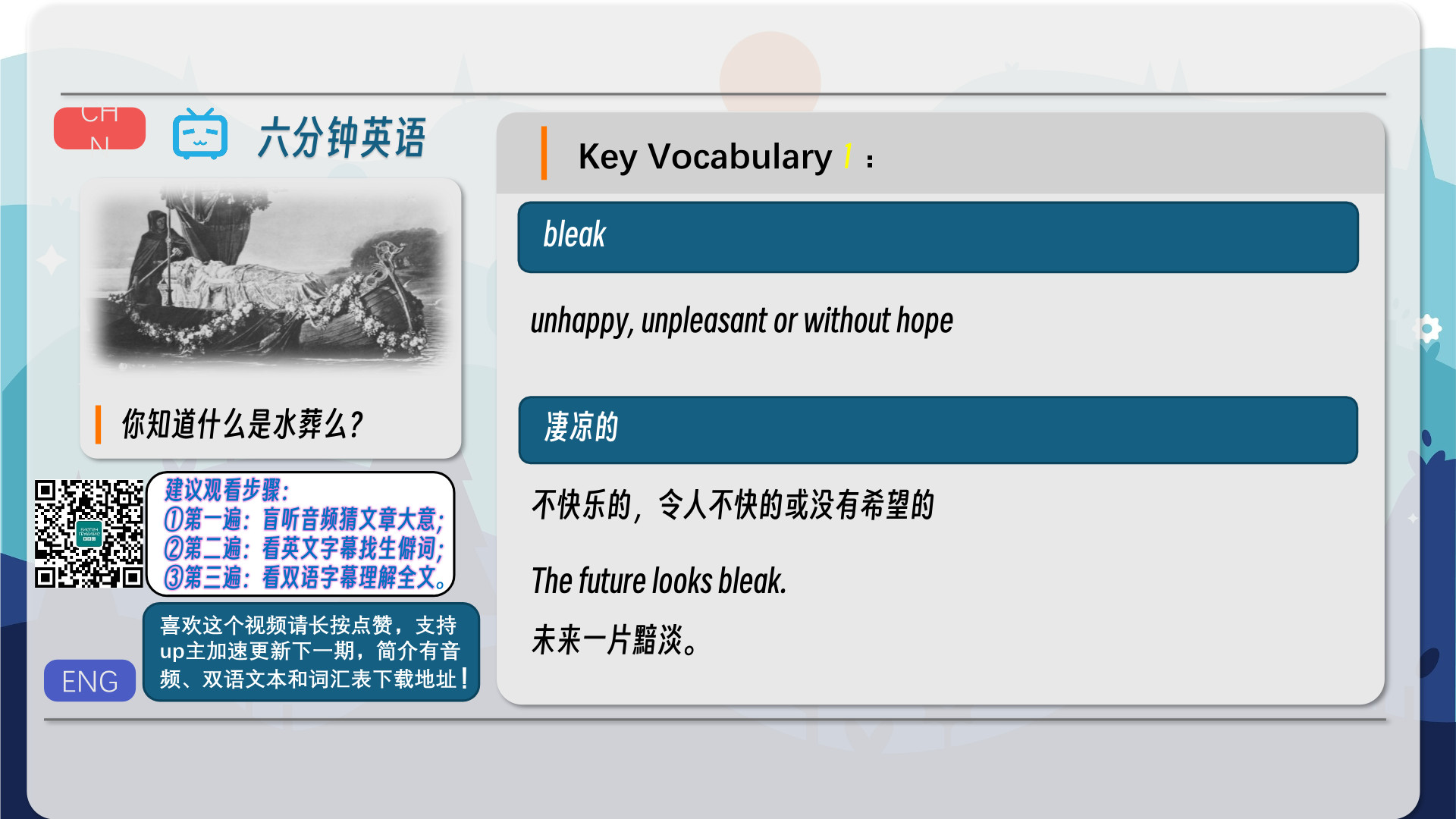
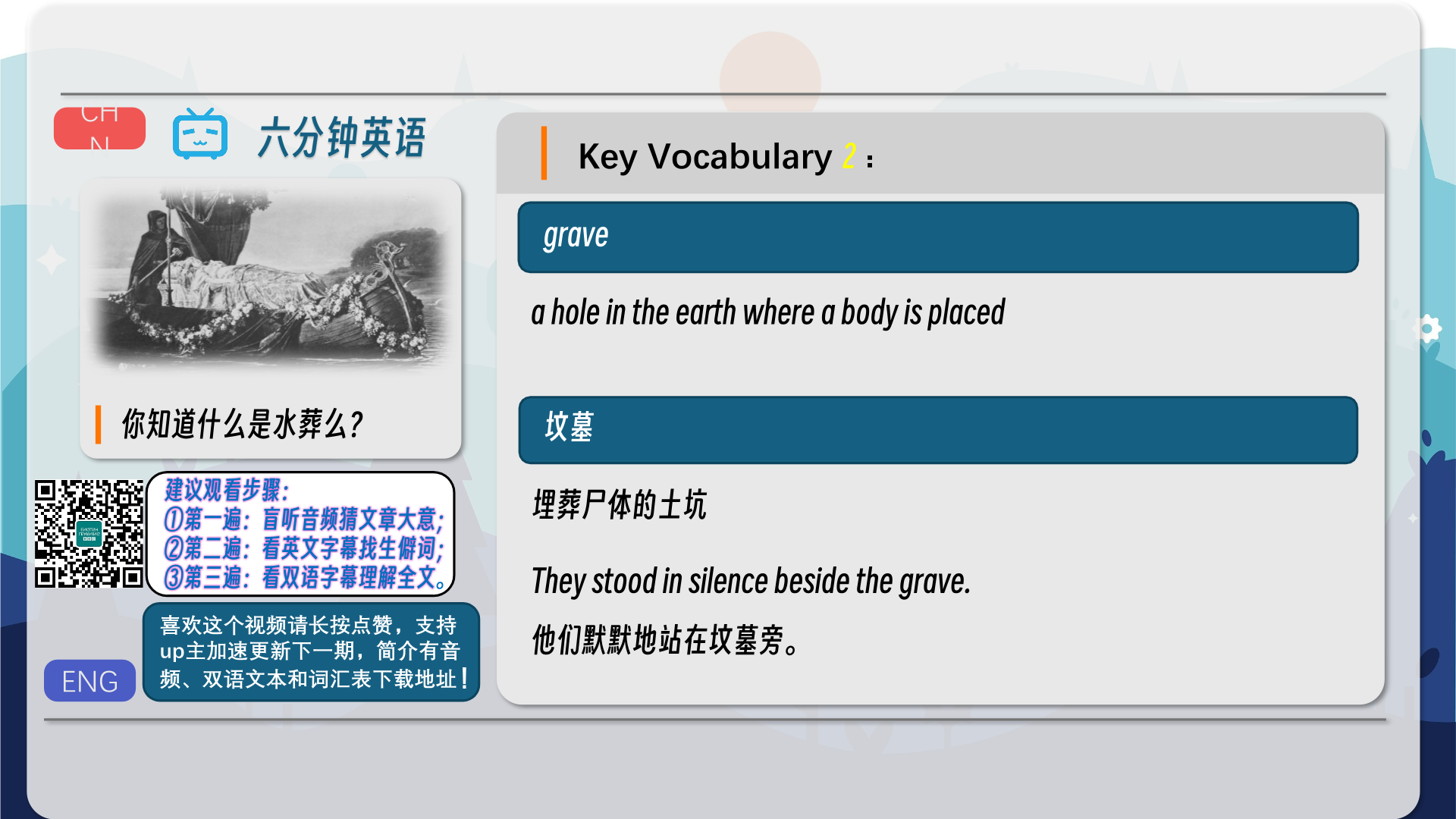
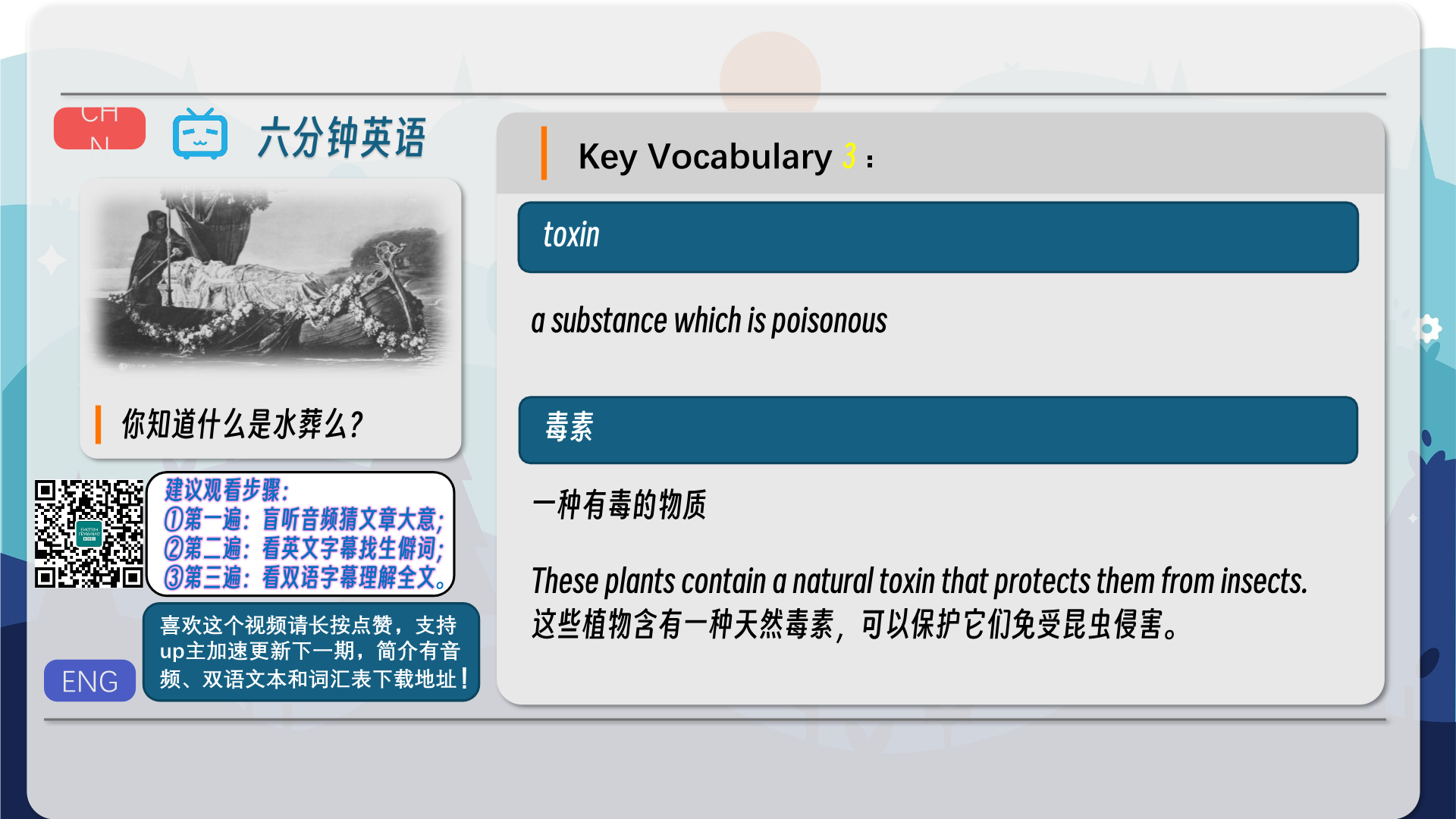
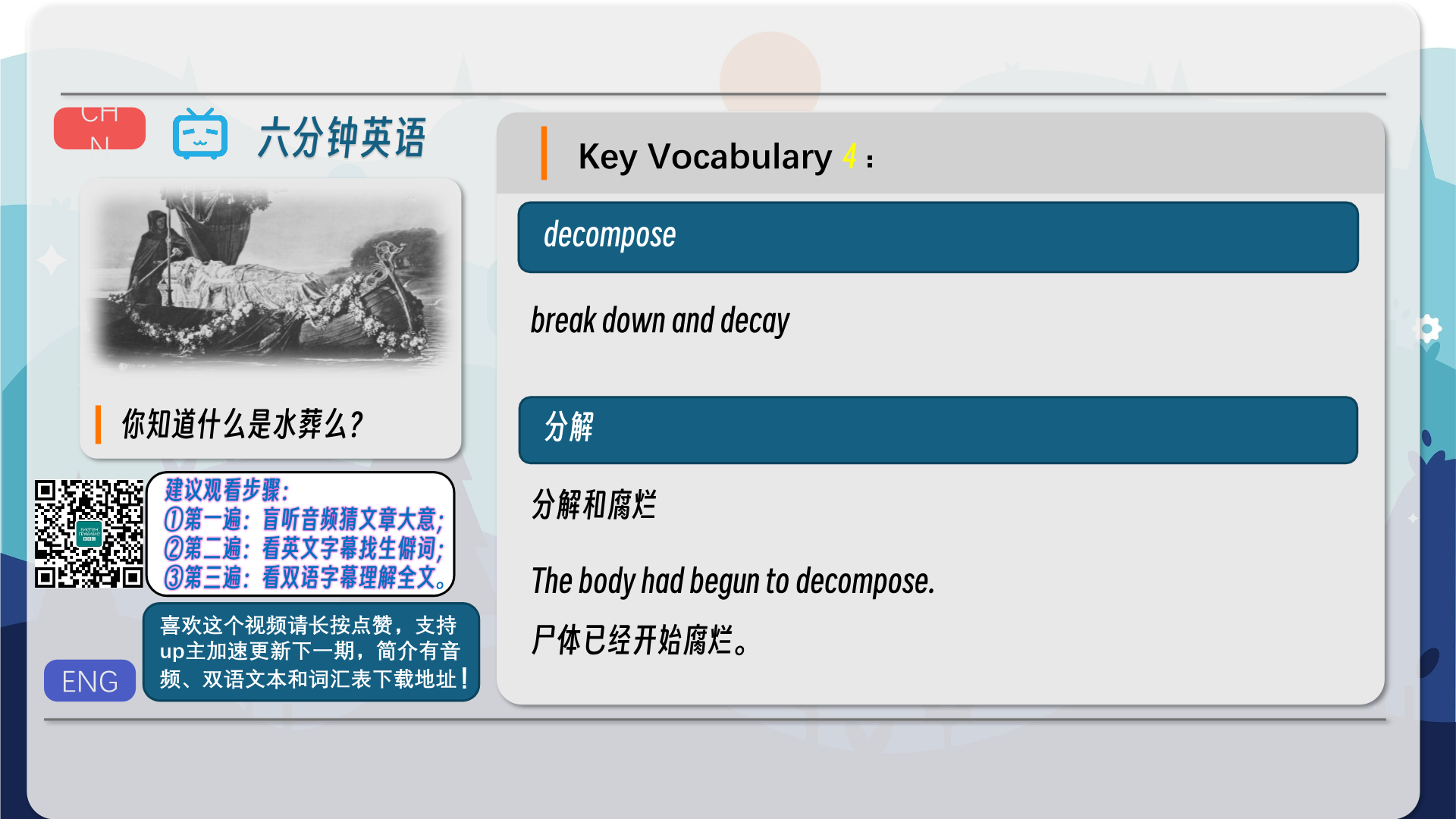
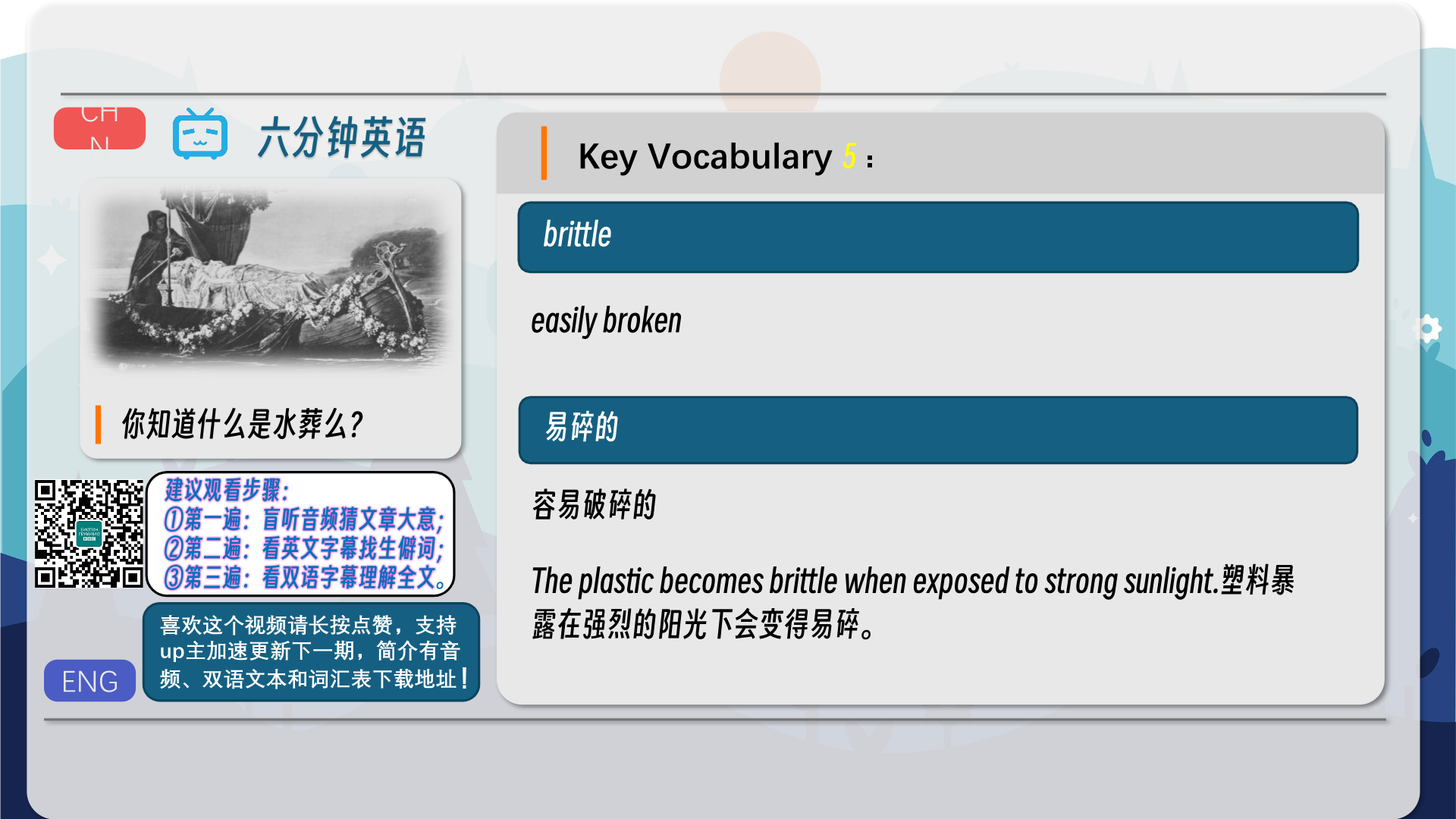
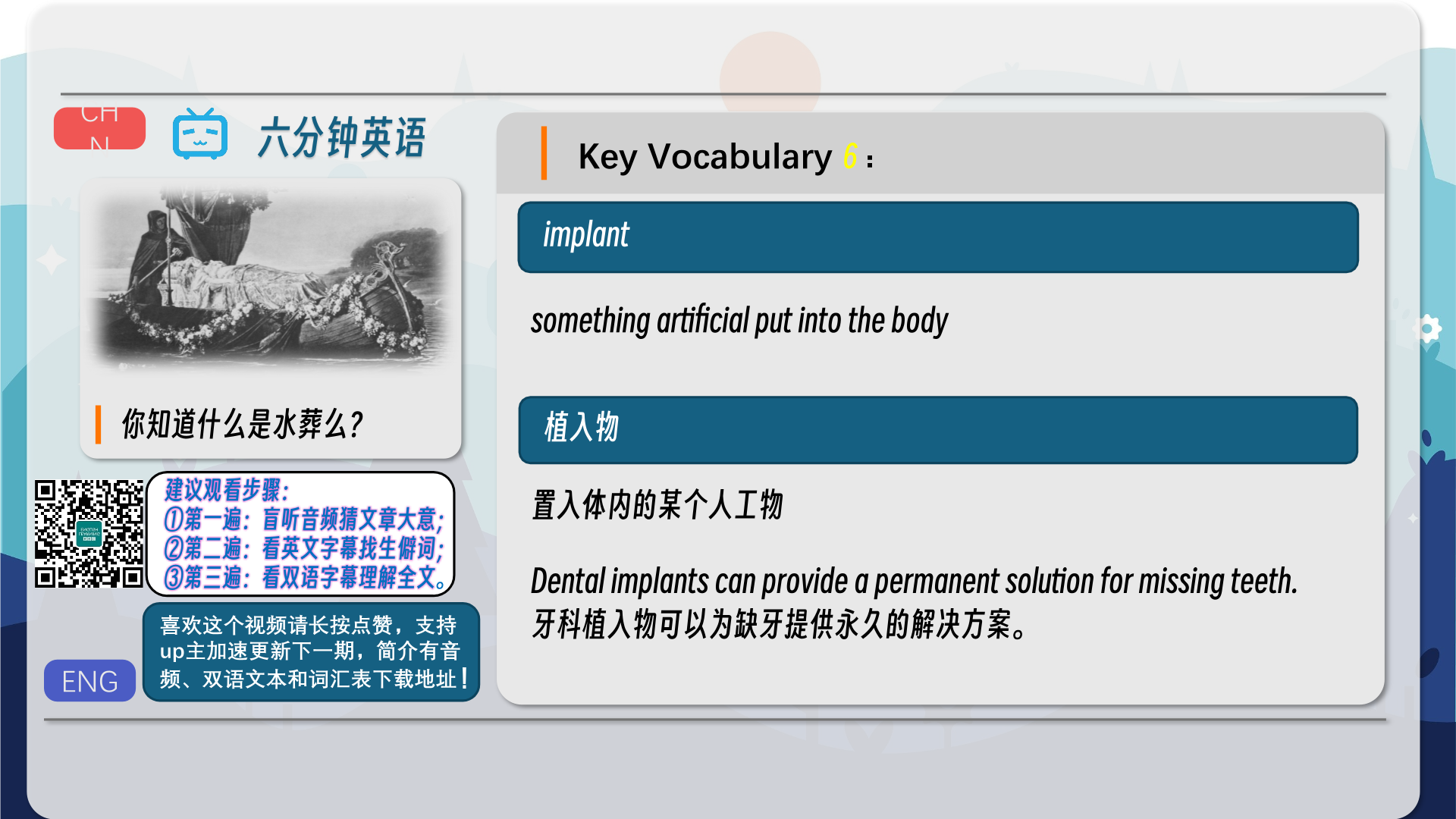
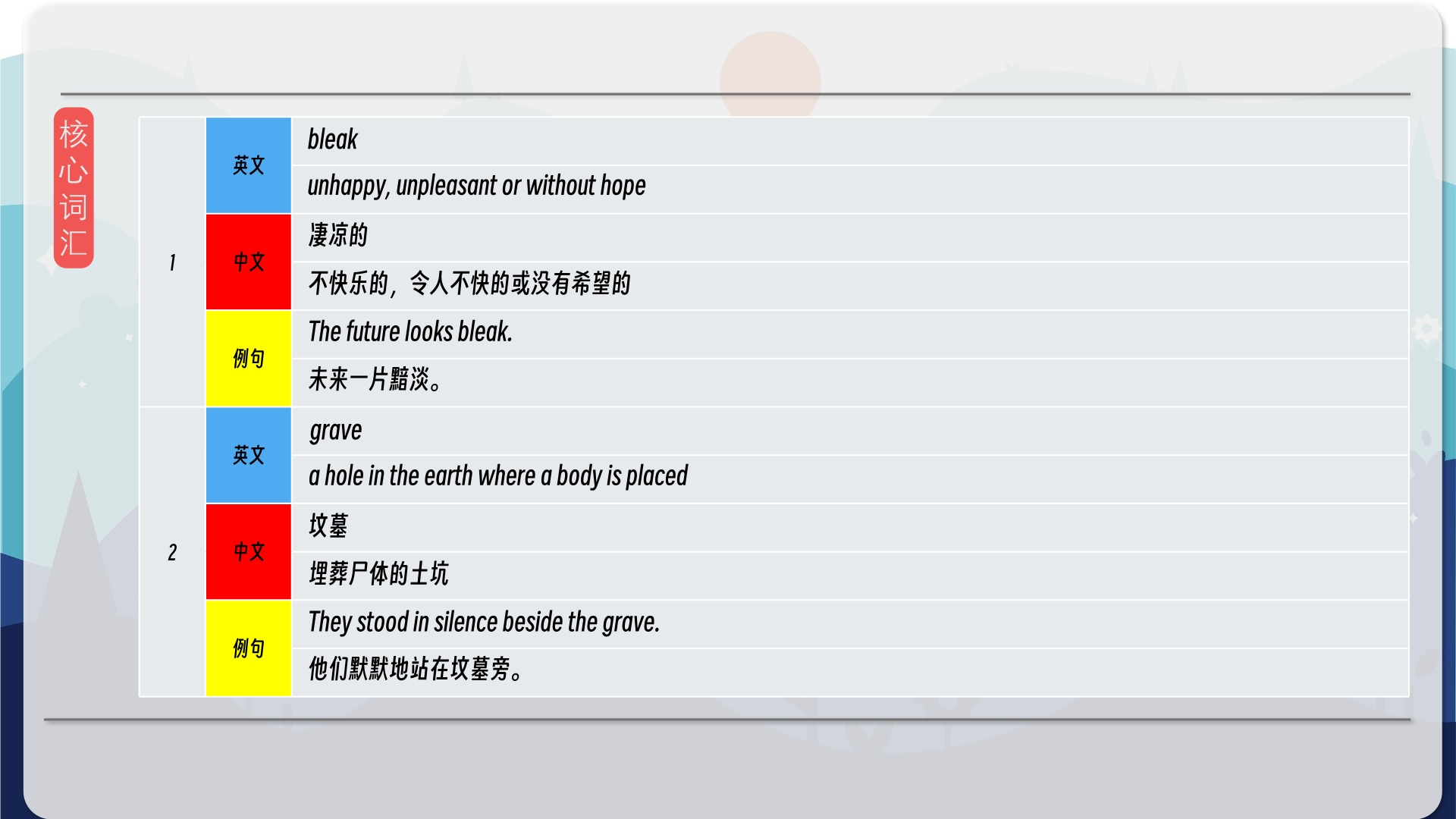
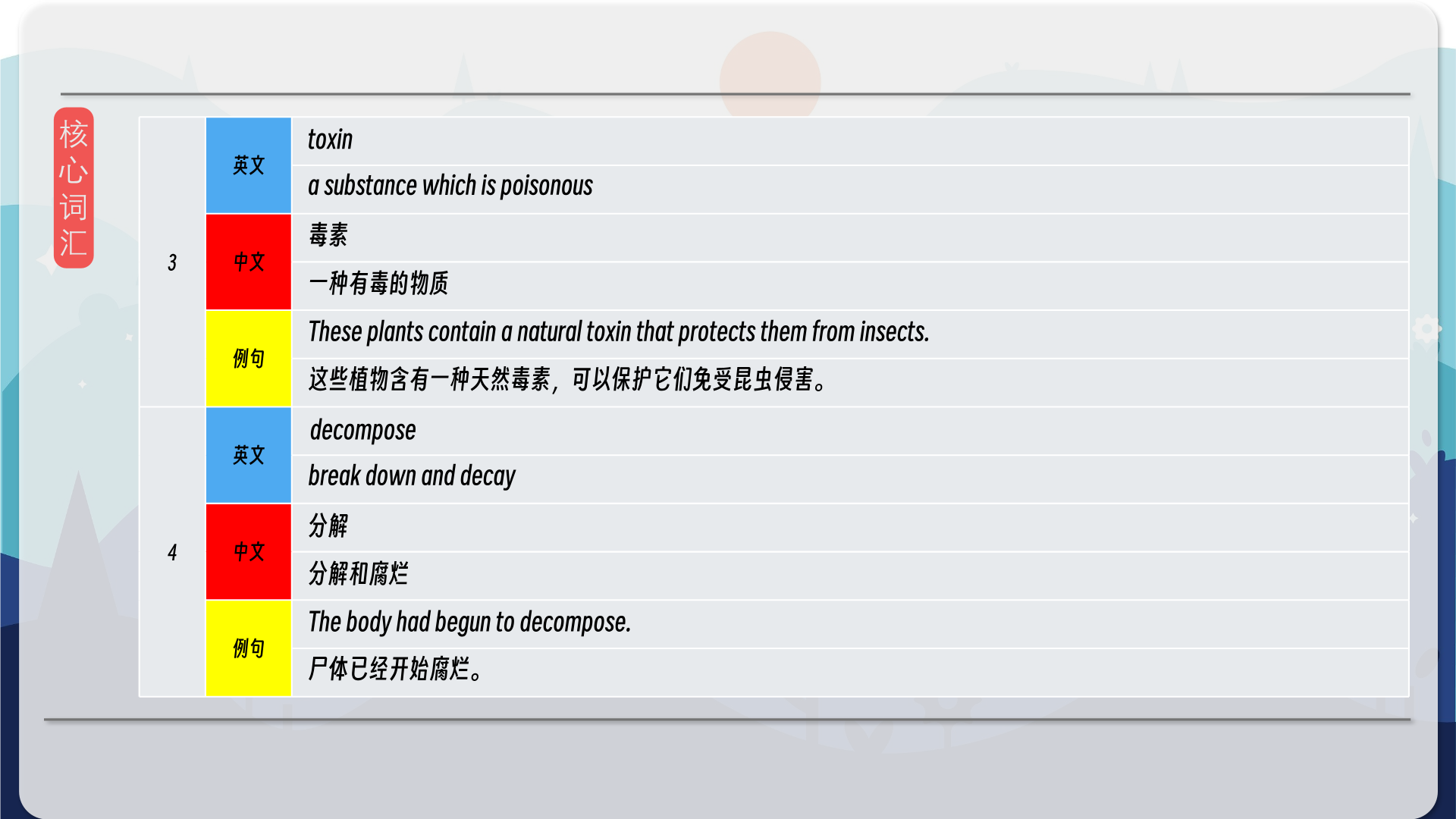
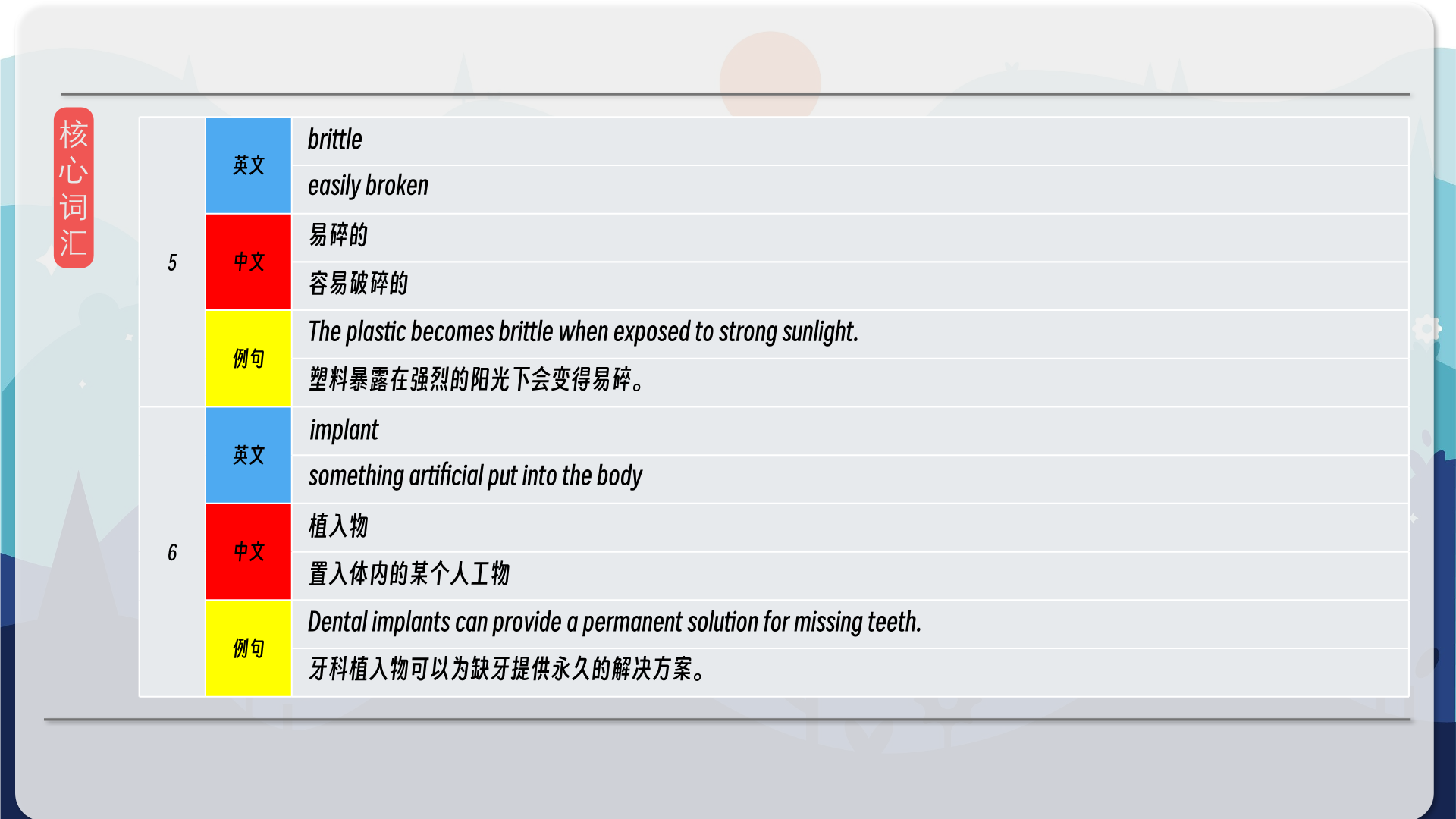
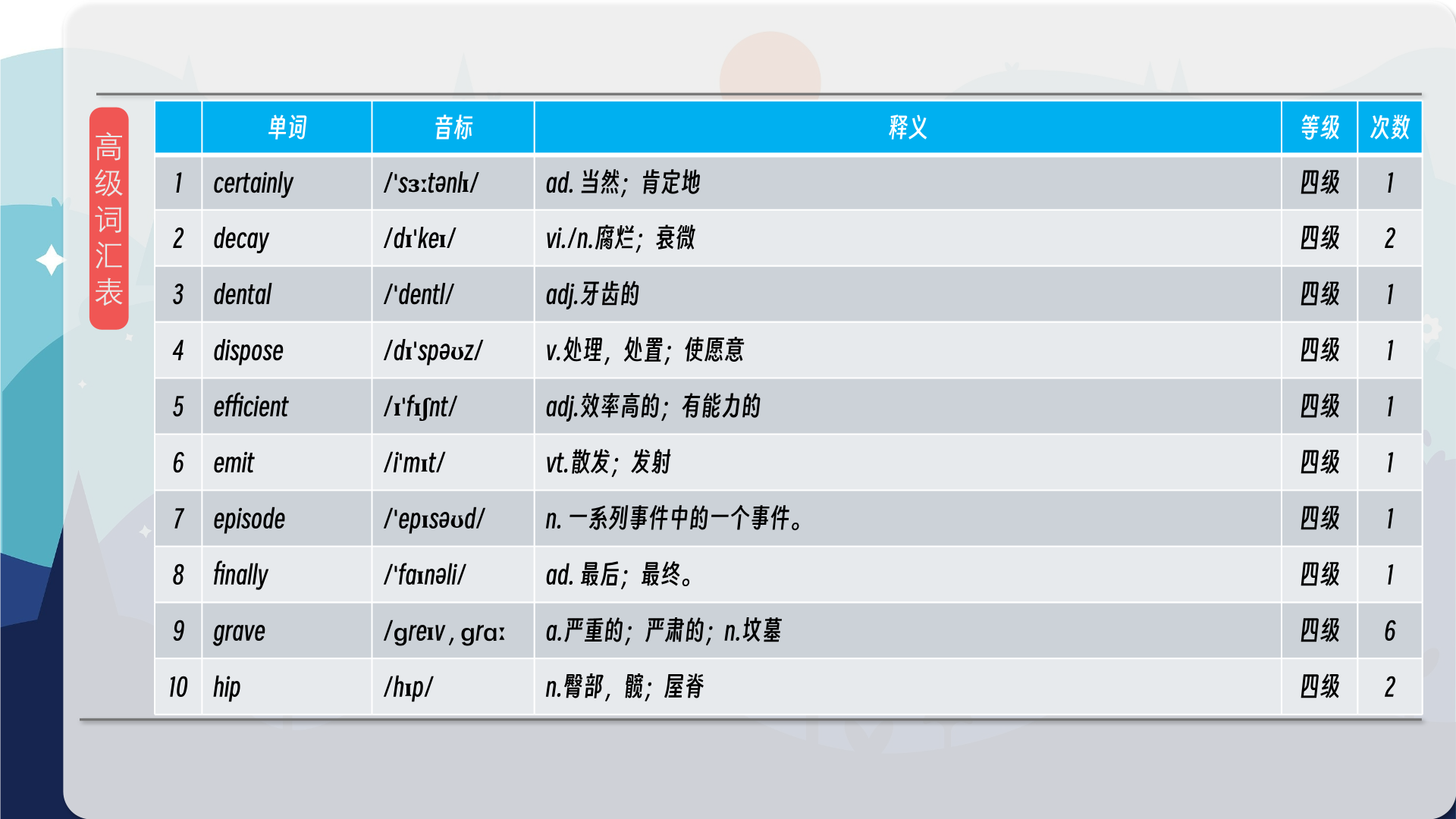
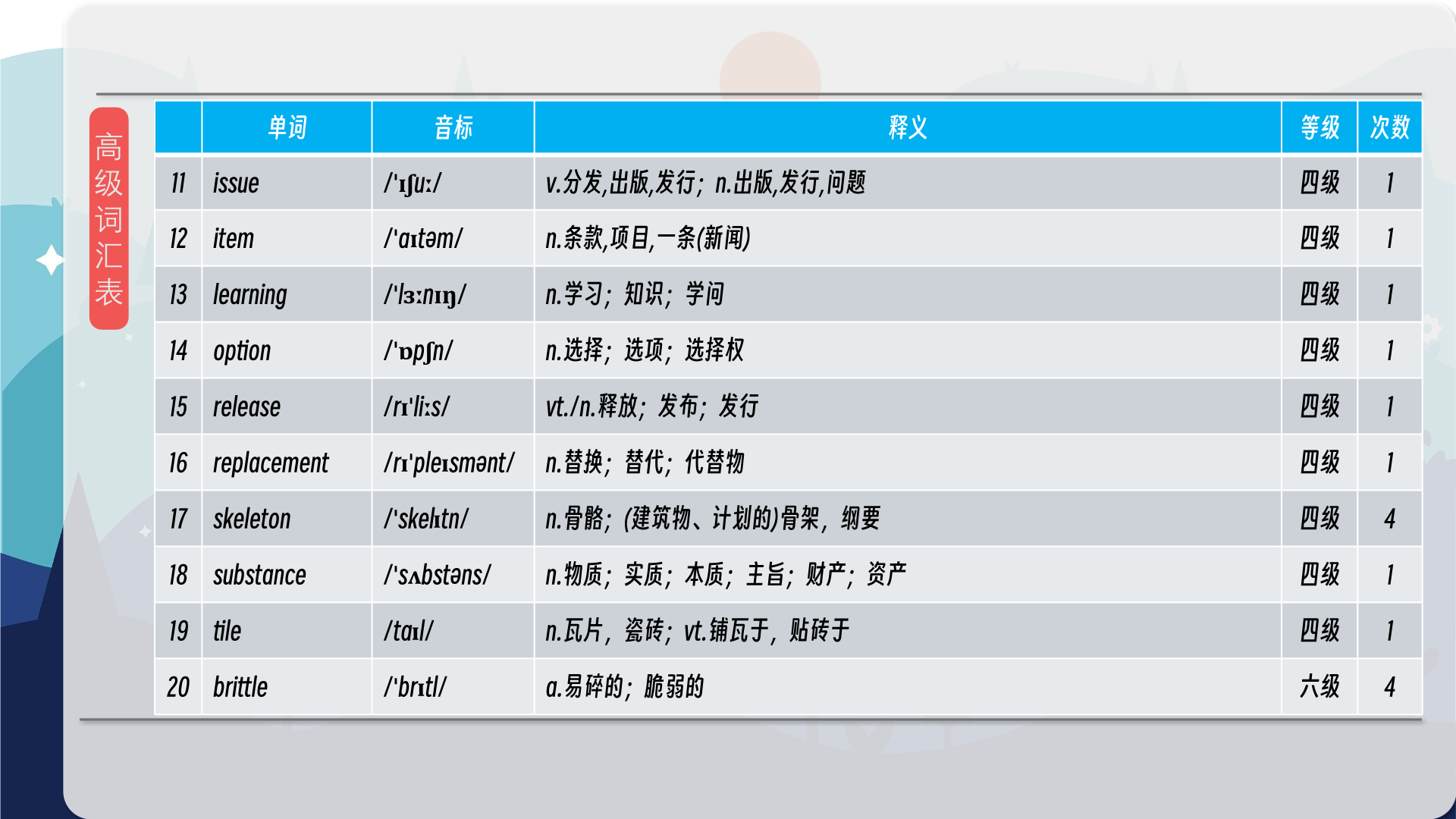
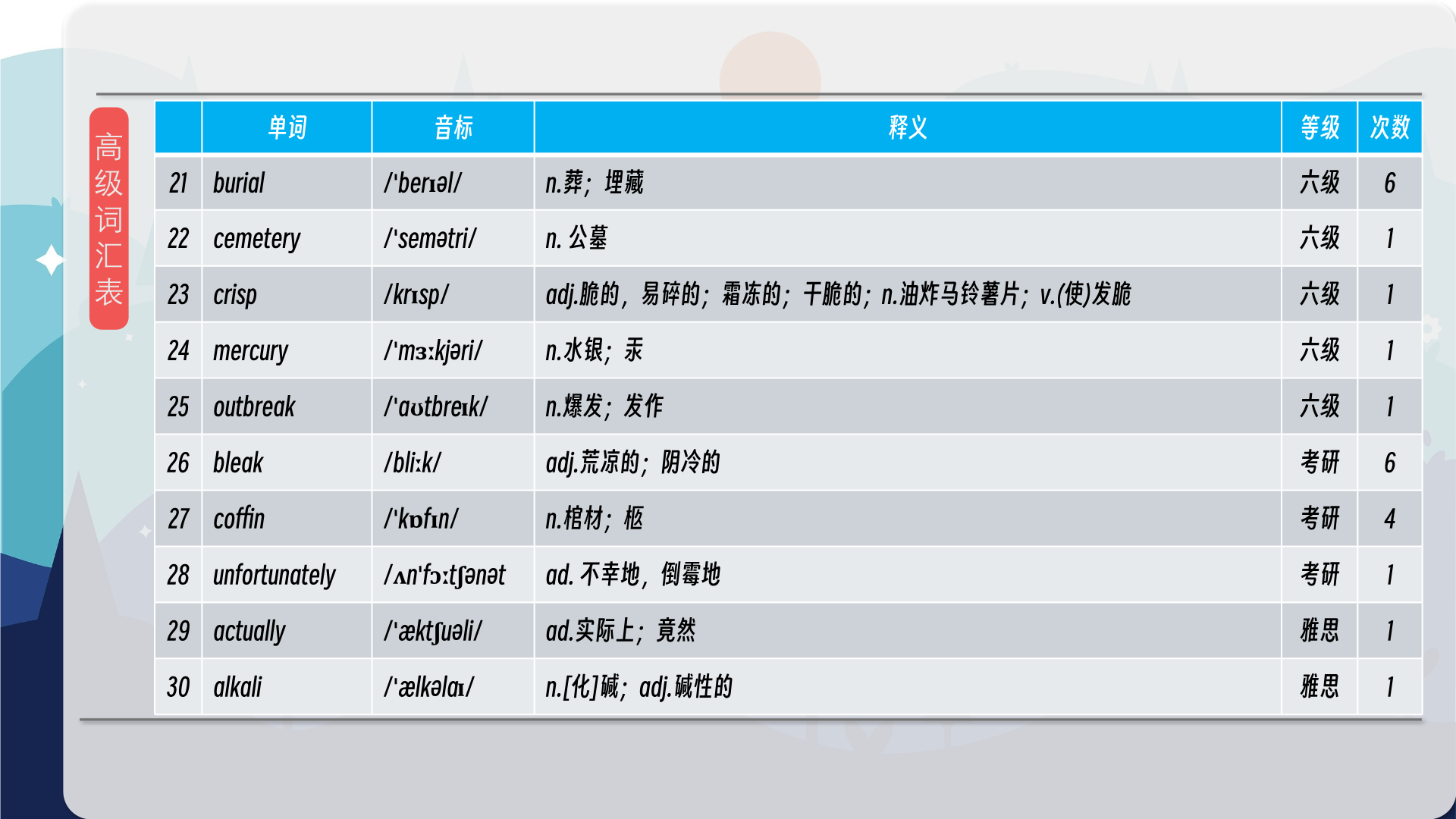
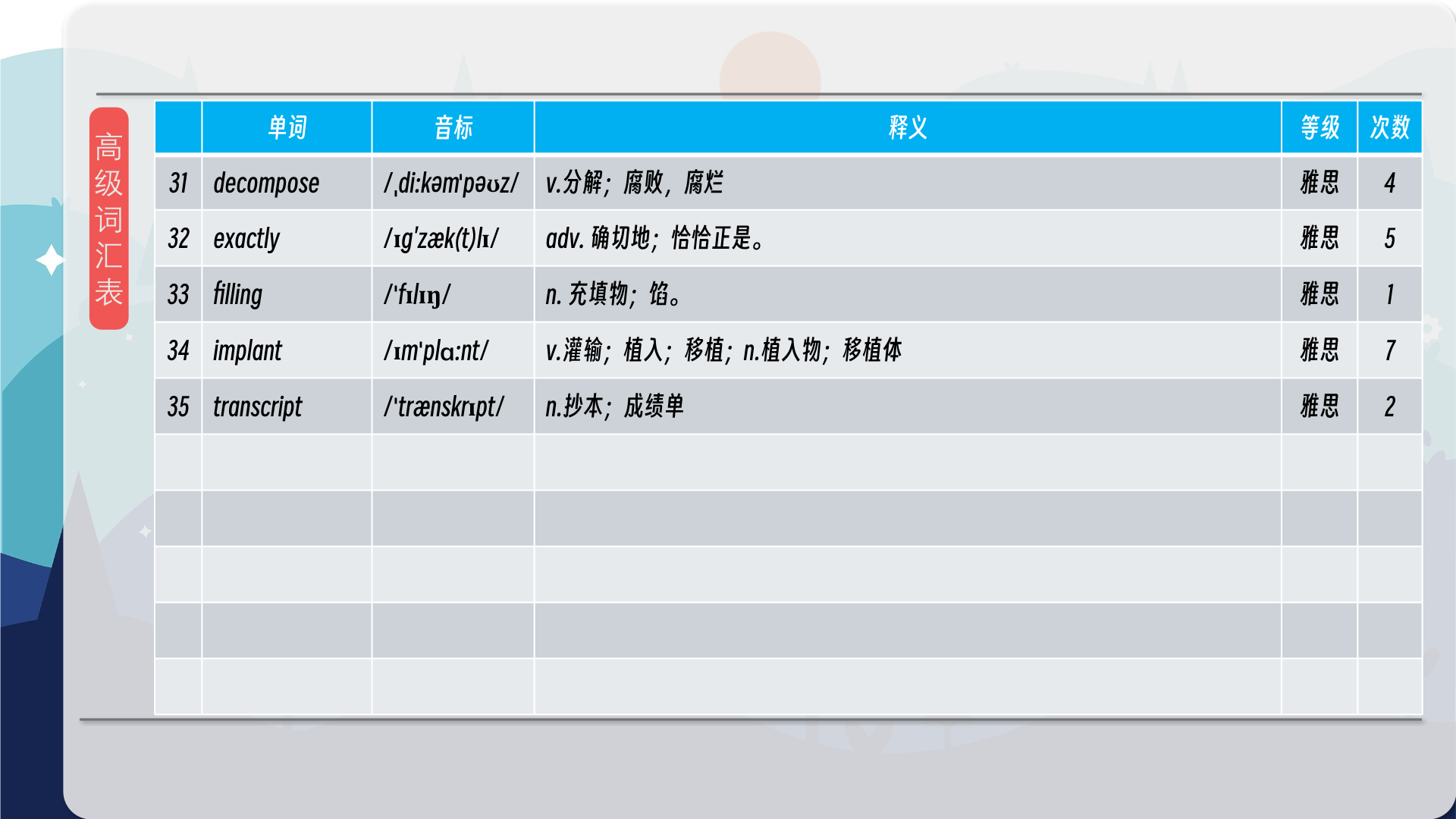

【核心词汇】
bleak
unhappy, unpleasant or without hope
凄凉的
不快乐的,令人不快的或没有希望的
The future looks bleak.
未来一片黯淡。
grave
a hole in the earth where a body is placed
坟墓
埋葬尸体的土坑
They stood in silence beside the grave.
他们默默地站在坟墓旁。
toxin
a substance which is poisonous
毒素
一种有毒的物质
These plants contain a natural toxin that protects them from insects.
这些植物含有一种天然毒素,可以保护它们免受昆虫侵害。
decompose
break down and decay
分解
分解和腐烂
The body had begun to decompose.
尸体已经开始腐烂。
brittle
easily broken
易碎的
容易破碎的
The plastic becomes brittle when exposed to strong sunlight.
塑料暴露在强烈的阳光下会变得易碎。
implant
something artificial put into the body
植入物
置入体内的某个人工物
Dental implants can provide a permanent solution for missing teeth.
牙科植入物可以为缺牙提供永久的解决方案。
在公众号里输入6位数字,获取【对话音频、英文文本、中文翻译、核心词汇和高级词汇表】电子档,6位数字【暗号】在文章的最后一张图片,如【220728】,表示22年7月28日这一期。公众号没有的文章说明还没有制作相关资料。年度合集在B站【六分钟英语】工房获取,每年共计300+文档,感谢支持!